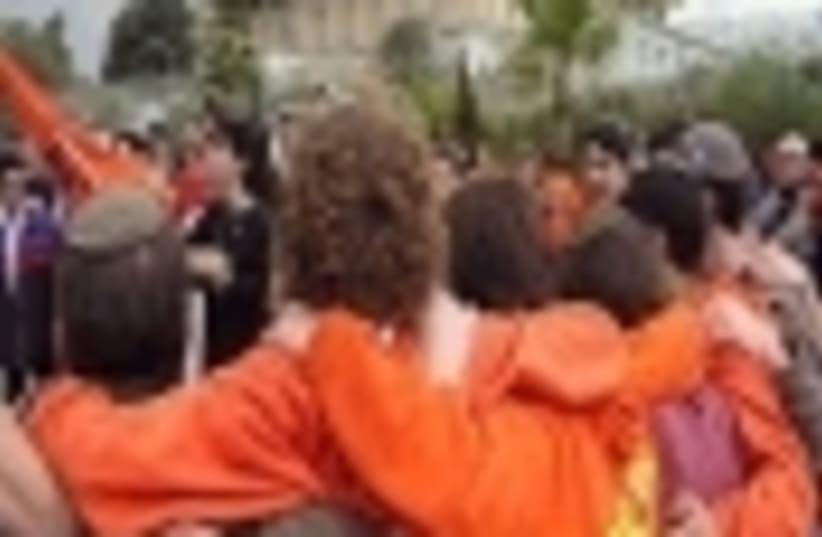Tensions in Israeli society laid bare by the Gaza withdrawal have once again highlighted the dichotomy between "Israelis" and "Jews" made popular by Shimon Peres. After his 1996 electoral defeat, Peres famously declared his loss a defeat for "Israelis." Asked who, then, had won, he replied, "the Jews."
Peres's dichotomy should not be confused with that between non-religious and religious Jews. Binyamin Netanyahu voters clearly outnumbered Shabbat-observant adults. Rather the distinction is between those for whom their Jewish identity remains primary (as Prime Minister Ariel Sharon always claims of himself), and those whose sense of themselves as Jews is vestigial at best.
The defeat of the Gaza settlers has emboldened "Israelis" to push for a decisive victory before demography decides the issue against them. They are acutely aware that one-quarter of the children born in Israel today are haredi, and that the birthrate of the national religious population is also far above the national average.
That is underlying meaning of Yossi Sarid's recent call for a showdown over the issue whether Israel will be a democracy or an Iran-style theocracy. Sarid knows full well that there are no such theocrats on the Israel scene. His real goal is to denude the state of any Jewish content.
For the sake of "Israelis," as well as "Jews," we'd better hope that the Jewish element of Israeli identity strengthens in the years ahead. Israeli identity, stripped of its Jewish elements, is too shallow to provide the internal unity, attachment to the Land and purpose that are vital for Israel's survival.
BY DEFINITION, Israeli, or at least Zionist, identity is inconceivable without the Jewish element, for Zionism is a movement to create a homeland for the Jews. David Ben-Gurion was no theocrat, but the Old Man recognized that only the Jewish element could provide Israel's raison d'etre and social glue.
A purely Israeli identity is too exclusionary, too prone to generating hatred. Haredim, new immigrants, all those who are too Jewish are left out. That is why "Israelis" make our best haters. Sharon lamented, in a post-disengagement interview with the haredi weekly Mishpaha, the lack of empathy for the Gaza settlers shown by those who spent the days of uprooting at the beach or in cafes. "We have masterminds of hatred here," the prime minister observed.
By contrast, those for whom Jewish identity is paramount cannot really hate their fellow Jews. They view themselves as too bound by a common history and, more importantly, a common national mission. For all the Gaza settlers' feelings of betrayal by the state, one did not find among them a parallel despair about the Jewish people. A certain rose-tinted vision of the essential goodness of the Jewish people, drawing upon numerous Torah sources, has always characterized national religious thought.
Jewish identity does not preclude a willingness to give away territorial sovereignty over areas rich in Jewish history. Many supporters of the Gaza withdrawal were sincerely motivated by the desire to preserve Jewish life or to safeguard Israel's large Jewish majority. But Jewish identity ensures that such withdrawals must always be painful.
For Shulamit Aloni, however, the Gaza withdrawal was entirely positive - the beginning of the redemption from the original sin of settlement of areas conquered in 1967. That "redemption," however, cannot be limited to territory beyond the 1949 Armistice lines.
Poet Eyal Megged relates a recent conversation with a fellow writer. The latter recounted his shock upon witnessing Jews dancing on the roof of an Arab house in Silwan shortly after the reunification of Jerusalem. Megged asked him, "And when you danced way back in the 1950s at a Purim party in the restaurant in Ein Hod that was once a mosque, and were hosted by friends in houses restored on the ruins of people who had been uprooted and expelled?" That, writes Megged, is when he finally got it: "The settlers are our scapegoat. They're our expiation. Their hidden role in the eyes of part of Israeli society is to atone for sin, the repressed sin that we refused to deal with."
SUCH EXPIATION will not ultimately suffice. Without a powerful sense of connection to the Jewish people's historical homeland, Israelis will inevitably come to view themselves, in Avirama Golan's phrase, as "a people that dwells on another people's land" in the entirety of Israel. Many already do. And those who view themselves as thieves will not, in the long run, fight to stay.
Of fighting there is no end in sight. New Republic publisher Martin Peretz, a supporter of the Gaza withdrawal, nevertheless expects that Israel will soon have to return to Gaza. Israelis, he writes, are "doomed to live dangerously. They can withdraw from Gush Katif, and later from Ofra or Beit El, but they cannot withdraw from the world in which they live.... [T]he country will live by its wits and by its nerves."
But nerves are frayed. As Ehud Olmert recently told a group of Jewish donors in New York, "We are tired of fighting, we are tired of being courageous."
That weariness is both understandable and dangerous. Doubts about the staying power of the Israeli public, writes Hillel Halkin, influenced Rabin and Peres at the beginning of Oslo (and he might have added Ehud Barak at Camp David): "The danger seemed real to them that, weary of sacrifice and losing its morale, Israelis might crack..." A purely Israeli identity cannot provide that morale or justify the necessary sacrifices.
Aloni once responded to someone who challenged her to identify the core of Zionism devoid of its nationalistic elements in one word: "Hebrew." But hundreds of thousands of Israelis living abroad have demonstrated, it is still possible to speak Hebrew in New York, Los Angeles and Miami. And if one's children do not, is that really such a tragedy as to justify the eternally vigilant existence that is Israel's fate?
| More about: | Benjamin Netanyahu, David Ben-Gurion, Shimon Peres, Ariel Sharon |
